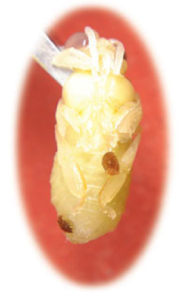
VARROA IN DENMARK
Read here on the background for the Danish varroa treatment directive. By the Consultants in Denmark’s Beekeeping Association
THE EXPERIENCE SO FAR
Since the varroa mite was first found on Als in 1984, great development in biological means of fighting the mite have taken place. Through the years expertise has been collected amongst researchers, consultants and beekeepers. We are the only branch of agriculture which now can say that the entire business can manage without the use of pesticides. This is in keeping with the development that society wishes for the production of foodstuffs.
THE DANISH STRATEGY
Beekeepers in Denmark have decided that honey and wax shall be produced without traces of medicine and pesticides. This is one of the most important aims behind the chosen strategy in combating the varroa mite. It is part of tradition which has characterised Danish beekeeping through generations. We have never used medicine and pesticides in treating bee disease, even though these are used extensively in other countries. It is slightly more troublesome to convert against attacks of foul brood, or to replace frames in order to contain nosema. But it works and we create pure products. Likewise it is said that it is more troublesome to combat the varroa mite through the removal of drone brood, and the use of lactic and formic acid etc. but it works, and we can continue to be proud of our products.
PESTICIDE-FREE HONEY AND WAX COMMAND HIGHER PRICES
It is important to maintain Danish honey as a pure product. It is important to keep the price of our own honey higher than the price of imported honey. There is also a large marked for pure beeswax. The cosmetics industry will not tolerate traces of pesticide in the wax they use. Danish beekeepers produce a surplus of beeswax. Good prices for wax provides for a better economy in beekeeping.
OXALIC ACID
Oxalic acid has been used by Danish beekeepers over the last few years in varroa treatment. Unfortunately, it now appears that this product does not figure in the so-called EU positive list of products that may be used in the treatment of bee disease. Therefore the product is not recognised in varroa treatment at the moment, but lactic and formic acids are. It is to be expected that oxalic acid will be put on the positive list in the near future.
REVISED PAMPHLET
This is the third in a series of pamphlets on varroa, revised according to latest findings. The Danish Beekeepers Association and Project Group Beekeeping carry out research independently and jointly and the results of this research, together with international findings form the background for this pamphlet. Development in the treatment continues strongly. It is to be expected that this edition shall be revised within the next three years (2001).
SUPPORT FOR THE STRATEGY
The Ministry for Food has passed the “Strategy for Varroa Treatment 1995 – 1999” which was produced by The Danish Beekeepers Association and The National Research Body. The strategy incorporates research, trials and advisory services to beekeepers on the necessary treatment. The research is carried out by Denmarks Agricultural Research Body and Project Group Beekeeping. They take part in diagnostic and information services. The Ministry for Food has provided financial support to the Association in order to employ consultants to carry out research and to advise on varroa treatment.
FIND OUT MORE ABOUT VARROA
Varroa – instructors: Throughout the country there are over 100 Varroa instructors. These are beekeepers who have promised to help colleagues with advise on varroa treatment. They have gained practical knowledge on varroa mites and their treatment on courses. You can meet the Varroa instructors in your local associations. A list of instructors has been sent to all associations and is to be found on the internet on udv9.osg.dk/html/vs4
CONSULTANTS
Consultants will give advise to all beekeepers on varroa treatment whether or not they are members of Denmarks Beekeeping Association.
PROJECT GROUP BEEKEEPING
Researchers from Project Group Beekeeping hold bee disease courses as well as taking part in courses and meetings in the associations. You can meet them there.
ADVISORY SERVICES TO ALL BEEKEEPERS
This pamphlet is in the Danish version sent out to all association members. It is also sent to all outlets for beekeeping equipment and to the varroa instructors. It is our hope that it reaches all beekeepers. Should you know beekeepers who have not received this pamphlet, call The Danish Beekeepers Association at (0045) 57865470, and we will be pleased to send out extra copies.